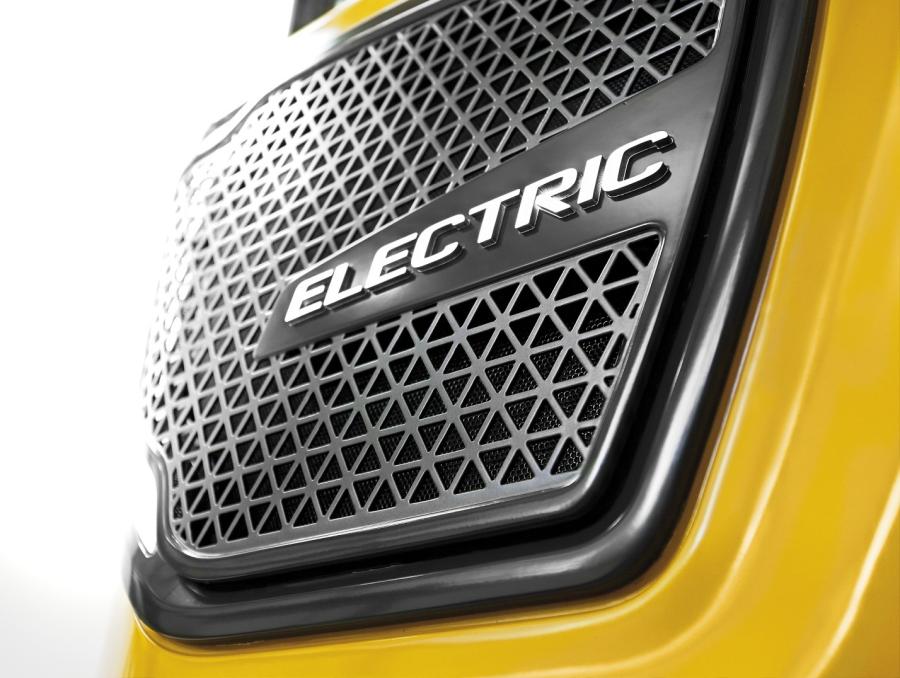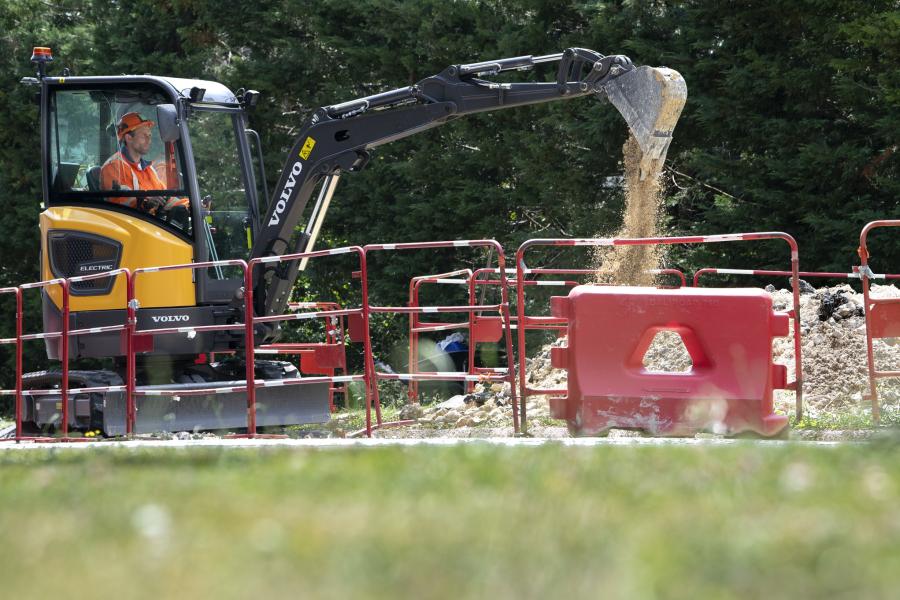The electric identifier of a Volvo machine.
With equal performance to diesel power and a much better operating environment, saving the planet has never been easier, said Elodie Guyot, head of Volvo CE's electric compact excavator range.
Electric vehicles have been around for almost as long as the automobile, but for the last 100 years or so Big Oil, in the form of petrol and diesel-powered combustion engines, has been the outright winner. But now things are changing, and electric power is about to give oil the shock of its life.
Over recent years society has come to realize the need to reduce our carbon footprint to protect the environment. This has led governments to set ambitious CO2 emission reduction targets. But they can only meet those targets if manufacturers develop compelling alternatives to oil-fuelled combustion engines. That's not all, the final point of the triumvirate is customers – they also need to buy into this new direction.
Technology's Fast Track
Fortunately, the stars are coming into alignment. Battery, motor and control systems are all developing rapidly, and the growing number of suppliers in the market mean that there is greater choice for OEMs. More players mean more possibilities to meet customers' requirements and more competitive pricing, and soon the price of componentry will start to come down. The performance of these elements is also increasing rapidly, such that they are now at a level where battery-electric drive is applicable for one of the automotive world's most demanding applications – construction.
Volvo CE unveiled its first electric products last year – one of which was the ECR25 Electric – a compact excavator in the 2.75 ton (2.5 t) class. It brings several benefits with it, not just zero emissions. These include a much-improved operating environment. The machine makes virtually no noise and has none of the vibrations associated with diesel engines either. The difference is remarkable, and something customers are pleased with. Customers are also pleased at not having to deal with fuel and oil, spillages etc, and the health issues of getting these on the skin.
Operationally, there are also benefits, e.g. zero emissions electric machines can work safely inside buildings. Because of this, one early adopter of the technology looks like being indoor applications and tunnelling contractors, where these machines' lack of exhausts mean that they operate safely in confined spaces and deep underground.
One concern about any new technology is: ‘Will it be better than what I've already got?' When it comes to Volvo's new compact excavators the answer is a qualified ‘Yes'. The performance is comparable to a diesel equivalent machine, and the 100 percent torque from standstill means that reaction times are faster. The batteries are also designed to last a full shift. These small machines don't tend to work continuously. The average in an eight-hour shift is that the machines will work for half that time. And with our new ECR25 Electric, its battery can meet that target for 80 percent of the time, depending on application – more for some, less for others.
The Price of Innovation
While prices are falling, the volumes of these machines are still tiny, meaning that there are no economies of scale in componentry to drive down costs. Batteries are the biggest component – and they are expensive. So, for the time being, electric construction equipment will be priced at a premium over traditional diesel-powered machines. But as volumes increase, Volvo expects prices to drop sharply, and move towards parity with diesel machines.
Batteries are also heavy, and add weight to these compact machines, even when counterweights are removed. But cell technology is improving rapidly, and Volvo sees even this teething issue will be soon solved. In terms of battery lifetime, it believe its batteries are good for the first life of the machine – 8-10 years.
Are Electric Machines Safe?
These compact excavators are as safe as any other electrical appliance. At only 48V, they aren't classed as high voltage, and require mainly common-sense precautions.
Some people point to the fact that electric machines aren't as kind to the environment as they claim – citing the rare earth minerals used in the componentry, and the fact that the electricity that powers them can come from ‘dirty' sources, such as lignite-fired power stations. And these critics are right, they are not 100 percent clean, but they are a step in the right direction. We can't afford to wait until all the challenges are solved but must work incrementally towards a common clean-energy goal. This is a societal issue, and beyond any one manufacturer to solve.
Is Electric Just for the Little Guys?
48V is great for compact equipment, but for larger machines we will need more power. For some applications, there is still a place for hybrids and even for plugging larger machines (like big excavators) directly into the grid.
While hydrogen fuel cells look like the ideal solution for electric power, emitting only water and heat as waste products, the technology is still immature, and needs further development. In the meantime, we will need to find the best electric solution for the machine and application, and not be too rigid in committing to one type of technology.
The Future Will Require Boldness
Volvo CE was the first company to commit to stopping the development of diesel-powered compact equipment, and devoting resources to an electric-only product future. Our step-by-step evolution will evolve bigger machines over time, as the technology become more powerful and robust, and we become confident that there is sufficient customer demand to make it pay. This also involves a fundamental shift in our business, one that will see us learning new competences and developing new business models.
We also need to be much faster in developing products and spotting new technology opportunities. While we are doing this, our dealer network will need to embrace the new technology and adapt their business models to a world where machines don't need the same maintenance regime as diesel powered machines do. There is plenty of time for this, as diesel power is going to be around for years yet. (Or at least combustion engines are – biofuels also show great potential.) But the change is coming. Electric machines are not just a flash in the pan. After a century of playing second best to Oil, electricity has arrived, and eventually electric power is going to take over the world.

Elodie Guyot
Elodie Guyot is Project Manager Electromobility at Volvo Construction Equipment, with a special focus on bringing electric compact machines to market. She is an experienced Global Product Marketing Manager with a history of working in the machinery industry.
Today's top stories





















